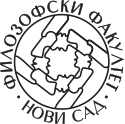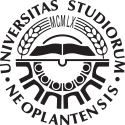15SCSC052 - Sociology of Leisure and Sport
| Course specification | ||||
|---|---|---|---|---|
| Course title | Sociology of Leisure and Sport | |||
| Acronym | 15SCSC052 | |||
| Study programme | Sociology | |||
| Module | ||||
| Type of study | ||||
| Lecturer (for classes) | ||||
| Lecturer/Associate (for practice) | ||||
| Lecturer/Associate (for OTC) | ||||
| ESPB | 3.0 | Status | ||
| Condition | - | Oblik uslovljenosti | ||
| The goal | The aim of the course is to present what sociology has to say on these issues. Hidden relations and links should be revealed, as well as deeper anthropological and sociological structures that determine them. | |||
| The outcome | This should help students to understand the issues of contemporary civilization of leisure, sport and “industry” of free time. | |||
| Contents | ||||
| Contents of lectures | The subject of Sociology of Free time; the main issues of Sociology of Free Time; compensation theory and free time; free time and leisure; hobby, free time, play and sport; free time and education; mass culture and free time; mass media and free time; idolatry and free time; consumption and free time; fun and free time; sport and free time; free time and tourism; social functions of free time and sport; negative forms of free time of young people; youth delinquency and free time; living standard, quality of life and free time; future of free time. Social and cultural environment and sport; modern way of life and sport; social stratification and sport; social functions (manifest and latent) and sport; local community and sport, national culture, national character and sport; organizational climate and sport; organizational strategies and sport; sport as a social institution; social power and sport; social mobility and sport; spectators; management of sport spectators; possibilities of humanization of sport. | |||
| Contents of exercises | - | |||
| Literature | ||||
| ||||
| Number of hours per week during the semester/trimester/year | ||||
| Lectures | Exercises | OTC | Study and Research | Other classes |
| 2 | 1 | |||
| Methods of teaching | Lectures, seminars, discussions, consultations. | |||
| Knowledge score (maximum points 100) | ||||
| Pre obligations | Points | Final exam | Points | |
| Activites during lectures | 10 | Test paper | ||
| Practical lessons | Oral examination | 70 | ||
| Projects | ||||
| Colloquia | ||||
| Seminars | 20 | |||

